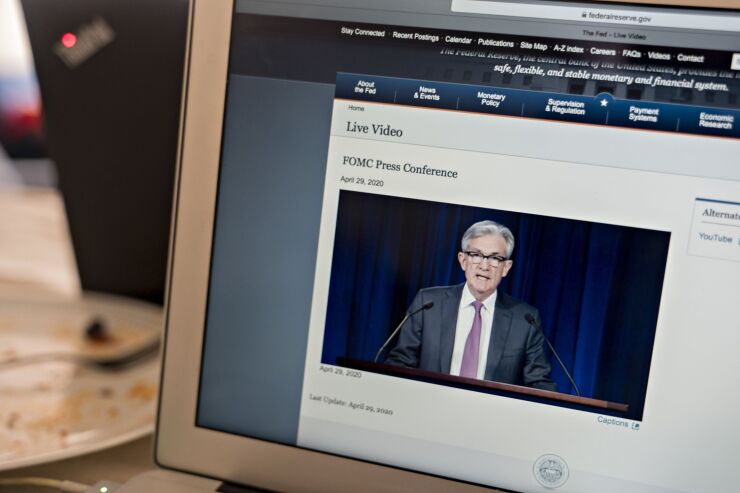WASHINGTON — Federal Reserve Chairman Jerome Powell committed on Wednesday to use the central bank’s complete range of tools to limit the economic fallout from the coronavirus, while at the same time urging Congress to do more to enact fiscal stimulus for American businesses and households.
In Powell's first press conference since the Fed slashed interest rates to zero last month — and his first by web videoconference — he did not mince words, calling the current downturn “unlike anything certainly that’s happened in my lifetime.”
“While many standard economic statistics have yet to catch up with the reality we're experiencing, it's clear that the effects on the economy are severe,” he said in his opening remarks at the conclusion of the Federal Open Market Committee’s meeting.
“The severity of the downturn will also depend on the policy actions taken at all levels of government to cushion the blow and to support the recovery when the public health crisis passes,” he said.

Although Powell said borrowers and the economy overall would benefit from the Fed’s programs, he also said that more fiscal stimulus from Congress would be needed to aid in an eventual recovery.
Key policies needed for a smooth recovery include those “that protect workers, businesses and households from avoidable insolvency and keep businesses going so that they're able to produce goods, and to either hold on to their employees or quickly rehire them,” Powell said.
“Those are going to be key policies,” he said. “They'll come with a hefty price tag, but we would come out of this event, actually, with a stronger economy with less long-run damage to the economy, so that's a key thing that really Congress could do.”
The Fed has launched 10 credit facilities to inject liquidity into areas of the economy that have been experiencing strain. The central bank has announced yet not fully implemented other facilities, such as its Main Street Lending Program and facilities for both the primary and secondary corporate credit markets.
The Primary Market Corporate Credit Facility and the Secondary Market Corporate Credit Facility — which are aimed at providing credit to large businesses — are “near being finalized,” Powell said.
But the rollout of the Main Street Lending Program, which will grant loans to eligible U.S. businesses with up to 10,000 employees or up to $2.5 billion in revenue, appears to be further off.
Although the Fed is close to issuing a new term sheet for the program, Powell said the Fed will “probably be continuing to work and expand Main Street for some time." He said it wouldn’t be completed as quickly as the corporate bond facilities.
Powell also sought to ease concerns that the Main Street Lending Program might face glitches similar to those in the Small Business Administration’s Paycheck Protection Program. Banks have been overwhelmed with PPP demand — so much so that the original amount Congress had allocated for the program ran out in a matter of days.
There are important differences between the two programs, Powell said.
The Main Street Lending Program “won't be the way the Paycheck Protection Program is where there's a specific amount … appropriated for it and then there's no more money,” Powell said. “That will be unlikely to happen here unless we exhausted Treasury's equity, and we're a long way from doing that.”
Powell emphasized that money will be distributed through the Fed's program using loans as opposed to grants, and as such, he’s not sure that the demand for the Main Street Lending Program will be as high as it is for the PPP.
Notably, Powell addressed concerns from some Republican lawmakers that the federal government’s massive stimulus package and economic interventions were adding to the deficit.
Powell, a Republican, called on Congress as recently as February to take action to reduce the federal budget deficit, and he has said the current level of debt is unsustainable.
But he sent a strong message to lawmakers Wednesday, arguing that the health of the economy is more important than concerns about the national debt.
“This is not the time to act on those concerns,” said Powell. “This is the time to use the great fiscal power of the United States to do what we can to support the economy and try to get through this with as little damage to the longer-run productive capacity of the economy as possible.”
The economic blow caused by the coronavirus has underscored “the importance of getting your fiscal house in order,” Powell said.
“The U.S. really hadn't gotten back to where we needed to get on fiscal policy, and so we have an already high level of debt to GDP and rising quickly when the shock arrived,” he said. “Ideally you would go into an unexpected shock like this with a much stronger fiscal posture.”





